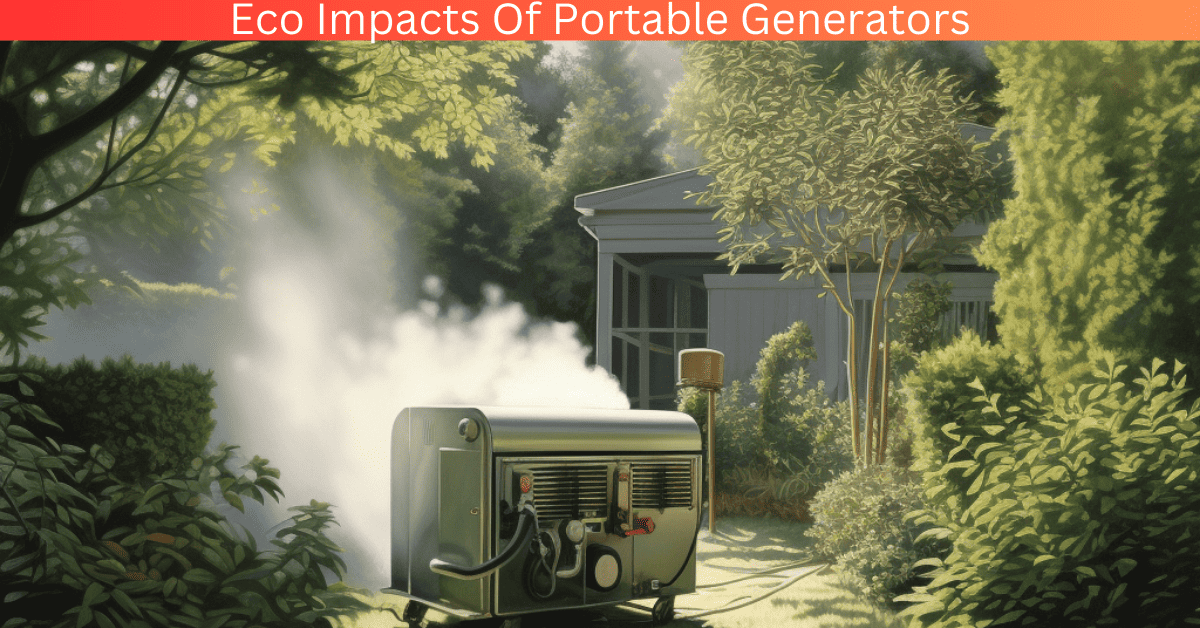
As consumers living in a world that values convenience above all else its easy to overlook the environmental impact of using portable generators for our energy needs. But if we want to be responsible citizens who care about preserving our planet for future generations – then why not take some time out now and explore how these devices impact our environment?
This is where I can help by guiding you through all essential elements related to investigating their ecological impact such as understanding their operational process or examining factors like fuel type or efficiency levels.
Plus we will also provide a few useful tips on how to use them wisely and help you pick an eco friendly generator that aligns with your needs.
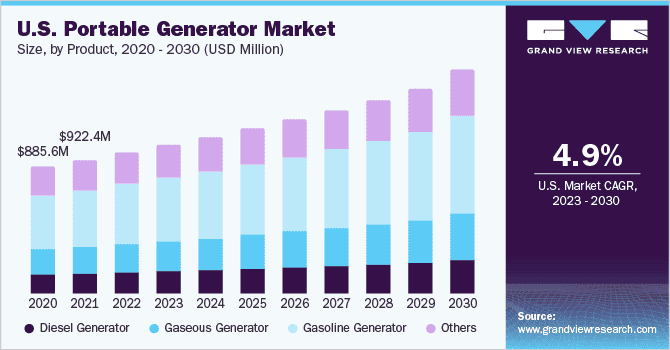
Image Credit: grandviewresearch
What Are Portable Generators?
Have you ever wondered about portable generators?
In short: they are machines designed with the ability of generating electricity without being connected directly with a grid based energy source. These portable wonders can prove incredibly handy when camping trips or tailgating events come up or whenever we’re dealing with an emergency power outage situation where no grid based energy is available nearby.
Regardless of whether you opt for small gasoline powered models or industrial sized diesel units (that emit greater wattage) expect them to range between 1,000 7,500 watts of output power – sufficient enough to power appliances such as refrigerators and air conditioners. While some generators offer multi device running capabilities as well depending on size/type; its important not only consider your requirements but also factor in costs before buying one – particularly keeping in mind that more fuel will be required for larger electrical loads (hence higher consumption of fuel) overtime. Say you find yourself in need of an electrical backup plan – whether its for adventure seeking purposes or as a survival strategy during tumultuous weather conditions.
In such cases portable generators can come in handy as compact and convenient energy sources. However its important to consider their inner workings and ecological footprint.

Image Credit: amazon
How Do Portable Generators Work?
Enquire no further as we unpack how portable generators operate! They rely on combustion engines like those found within vehicles such as cars, boats and lawnmowers; running off diverse fuels ranging from motor gasoline to diesel fuels and natural gas – each with varying effects on the environment.
After starting up the engine of a portable generator unit- driving with it a generator head- electricity is created which runs through an outlet socket that allows you connect different appliances & tools requiring power sources. When choosing which type of fuel to use when buying a new portable generator device or maintaining an existing one, always evaluate its ecological impact. Petrol (gasoline) might be relatively cheap but can quickly pollute surrounding areas if not handled appropriately or serviced frequently while Diesel’s decreased emissions compared to petrol come at higher costs with limited accessibility sometimes.
Natural gas comes out as a cleaner-burning option than both petrol and diesel but isn’t always an alternative when in remote locations where portable generators are needed. Prioritize your fuel needs by taking note of the environmental implications and your usage requirements to make the best-informed choice! In moments of uncertainty or adventure having access to uninterrupted electricity is key. But when it comes to choosing the fuel that powers your portable generator there are several factors to consider.
To ensure that you choose wisely we’ll examine each type in depth and weigh their respective pros and cons.
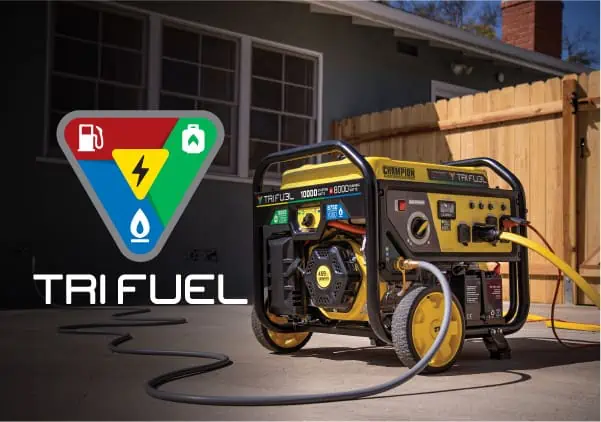
Image Credit: championpowerequipment
What Kind Of Fuel Do Portable Generators Use?
Do you often wonder which type of fuel propels your portable generator? Its an interesting inquiry that deserves attention since we rely heavily on these machines during power outages or camping trips where electricity isn’t available. As it turns out most portable generators run on either gasoline or diesel fuels. Let us examine the ecological impacts of each.
Gasoline is usually preferred for its accessibility and affordability; however using this fuel comes with environmental drawbacks such as high emission rates and excess noise levels when operating a generator. On the other hand although diesel has lower emission rates than gasoline it still generates notable noise pollution. When considering which power source to use for your generator its crucial to prioritize sustainability and the impact on our environment. By opting for propane or natural gas you would be taking steps towards reducing harmful noise emissions and limiting pollution levels. In terms of efficiency, diesel and natural gases reign supreme with high performance ratings that reflect their energy output efficiency levels.
Being mindful of each type of fuels ecological impact will help you make an informed decision about what suits your portable generator needs best – making a positive impact on both our planet and your wallet in terms of long term fuel cost savings. But just how efficient are these generators really?
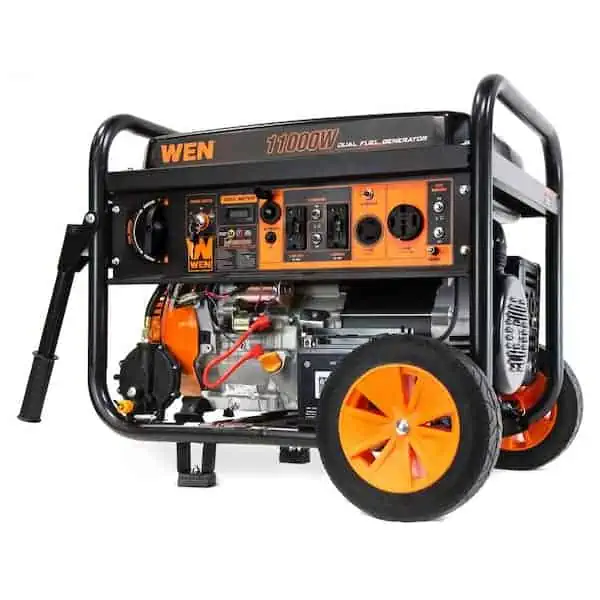
Image Credit: homedepot
How Efficient Are Portable Generators?
The increasing popularity of portable generators comes as no surprise given their ability to provide reliable electricity during emergencies or outdoor activities where traditional sources may be unavailable or inconveniently located. However determining their efficiency requires careful consideration. Efficiency in portable generators refers to how well they convert fuel into electrical energy through accurate balancing between load capacity and fuel consumption rate.
Generators with high load capacities and low fuel consumption rates are more efficient than those with either low capacities or high fuel consumption.
Its vital to note that different generators are built for specific loads and choosing the type that meets your requirements is essential. Awareness of technical specifications and efficiency ratings allows you to make an informed decision saving you money while reducing waste. Now armed with this information, we can delve deeper into comprehending the environmental effects caused by portable generators.
Image Credit: powergenerationservice
What Are The Environmental Impacts Of Portable Generators?
You may find using a portable generator convenient in certain situations but before you decide whether its right for you consider its environmental impacts first. Without proper precautions these generators can do more harm than good when it comes to our planets health.
Most models are powered by gasoline or diesel fuel which emit toxic fumes when burned that threaten both our climate and clean air efforts worldwide – not something we need more of! Moreover discarding used fuels incorrectly could result in soil contamination harming wildlife populations nearby.
However don’t lose faith just yet! There are ways to minimize the risks associated with using a portable generator without sacrificing its perks entirely! Start by purchasing models which have received certification from the EPA as having low emissions levels – always check the product specifications before buying one though! You could also opt for cleaner fuels such as natural gas or propane instead of traditional options like gasoline or diesel; doing so would significantly help decrease pollution levels in both air quality as well as greenhouse gas emissions reduction efforts.
Lastly but crucially important – dispose of combustible fluids responsibly within your local regulations or seek guidance on the proper ways to do so because every small step counts towards preserving our planets health! The environmental effects of using portable generators cannot be ignored; hence making an effort to choose one with minimal impact is imperative.
Thus, being mindful of environmental considerations during selection can result in more sustainable usage and a healthier planet.

Image Credit: marketsandmarkets
How To Choose An Eco-Friendly Generator
Looking for a generator thats both reliable and environmentally friendly? With so many different models available on the market today it can be tough figuring out where to start. But by taking note of certain features and asking yourself essential questions you’ll soon discover that finding an eco friendly generator doesn’t have to be complicated at all.
One key factor to keep in mind when selecting your ideal generator is size. For portable generators with minimal environmental impact consider choosing the smallest size that still meets all your energy needs. Smaller generators typically use less fuel and leave behind less of a carbon footprint than bigger ones do making them a better option for those concerned about sustainability. And if you need more power overall?
Try using multiple smaller generators rather than one large unit.
Additionally pay attention to what type of fuel each generator runs on. Gasoline may be widely available but propane has fewer emissions and longer runtime potential.
If eco friendliness is paramount in your search there are also models that run on solar or biodiesel power—options worth investigating for those committed to reducing their carbon footprint. No matter which model you choose in the end just make sure you’ve done enough research beforehand so that you’re confident about making the right investment for both your needs and our planets health!
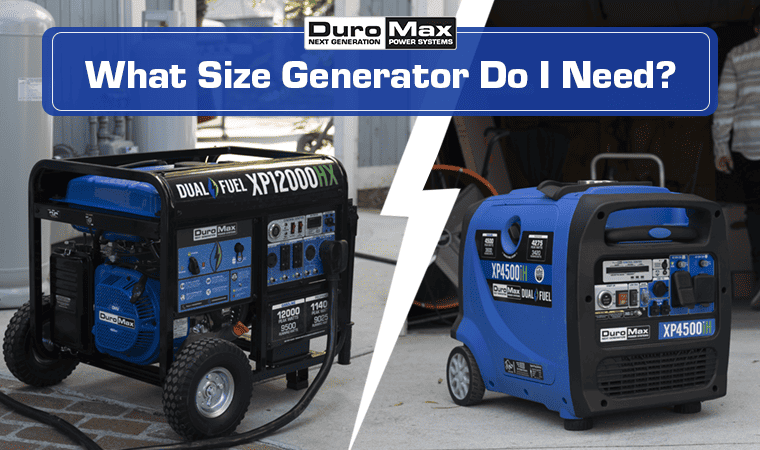
Image Credit: duromaxpower
Tips For Using Portable Generators Responsibly
Minimizing the environmental impacts associated with using a portable generator requires adhering to responsible usage guidelines.
One crucial aspect of this involves carefully selecting the right fuel type for your device rather than opting for convenience over efficacy. Choosing recommended fuel types enhances engine operation efficiency while decreasing harmful exhaust fumes discharged during use.
Alongside choosing the correct fuel type comes regular maintenance which plays an important role in ensuring both optimum functionality and reduced impact on surrounding environments – such as cleaning an air filter periodically checking oil levels regularly as well as replacing spark plugs when needed.
Lastly but still essential is responsible refueling practices such as avoiding gas tank overfilling which reduces harmful emission gases released into our environment from exhaust fumes whilst increasing combustion efficiency at the same time
In conclusion implementing simple habits such as proper selection of recommended fuel types coupled with properly maintaining your portable generator helps reduce its eco impact significantly before making any financial commitment to owning one.

Image Credit: amazon
The Pros And Cons Of Portable Generators
Portable generators offer plenty of flexibility in terms of location based energy access. However its important to consider the environmental impact they make. In positive news portable generators offer a convenient solution when theres no power available from the grid.
If you’re someone who loves camping or spends time in remote areas frequently this could be an especially valuable tool to have in your arsenal. The downside is that using gasoline powered generators produces harmful emissions like carbon monoxide and nitrogen dioxide that can have serious health consequences over time. Its essential to weigh up the ecological cost of using these generators – something we often overlook in pursuit of convenience.
Ultimately if you do choose a portable generator for your needs make sure you use it responsibly and consider how it fits into a framework of environmentally conscious behavior overall. Small changes can add up! To further our knowledge on portable generators, it’s essential to answer some of the prevalent inquiries surrounding them. Ensuring that we don’t lose sight of the fundamental points previously discussed is paramount as we move forward.

Image Credit: ecomena
Common Questions About Portable Generators
Portable generators are becoming increasingly popular among individuals who seek an efficient energy source in certain circumstances. However these devices should be used with caution and careful consideration regarding their environmental impact, safety concerns and financial costs are necessary before making any decisions.
Before purchasing a portable generator there are several key factors that must be acknowledged such as how much power you require and if mobility is essential.
The type of fuel used by your chosen model must also be considered alongside its refuelling frequency while taking into account special rules or regulations governing usage within your location too.
Additionally potential hazards associated with using generators like carbon monoxide poisoning and noise pollution need to be taken seriously.
Depending on its intended use (regularly around public areas or near residential spaces) extra measures may need implementing such as seeking additional permits as these devices can pose risks when used irresponsibly.
Its important to be aware of other options that may be more suited for your specific needs as portable generators do have some potential setbacks despite the benefits they offer.

Image Credit: foxnews
Alternatives To Portable Generators
Portable generators are no doubt essential tools used in powering both homes and businesses; however their environmental impact cannot be ignored any longer. This highlights the importance of seeking out alternative options that still guarantee reliable power supply while minimizing damage to nature around us. Solar power offers us such possibilities by providing efficient ways we can generate clean electricity from rooftop or backyard solar panels with zero emissions or noise pollution which makes it ideal both environmentally friendly and user friendly.
Although transitioning might seem like quite a big investment upfront over time you begin to enjoy significant savings through reduced energy bills as well as tax credits and other incentives available depending on your location. Another solution to consider is wind power that harnesses the powerful winds available across various locations by either installing a turbine on your property or opting to purchase energy from a larger utility scale turbine to avoid any environmental harm. Besides storing generated output for future use when wind speed is not optimal serves as an excellent way to keep making strides towards sustainability while still enjoying reliable power supply in our homes and businesses.
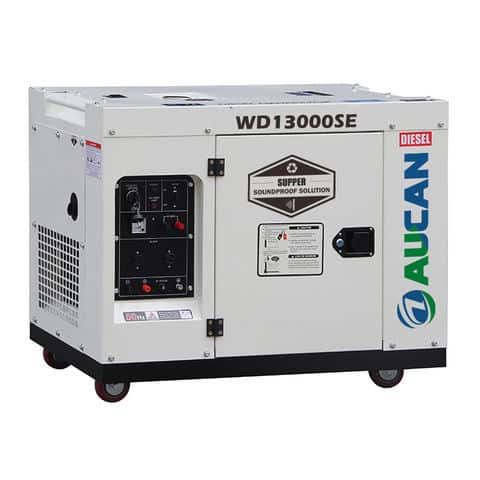
Image Credit: globalsources
Frequently Asked Questions

Image Credit: dynamicgrp
How Often Should A Portable Generator Be Serviced?
If you’re committed to reducing your carbon footprint while also enjoying the benefits of portable power generation then properly maintaining your unit is an absolute must.
To keep your generator running smoothly and maximize its environmental potential, regular servicing is essential – ideally once per year or every 100 hours of use (whichever comes first).
During each maintenance check up be sure to check the engine oil level carefully and replace if necessary; inspect the spark plug for any visible damage such as corrosion or wear; and tighten all fittings firmly as needed.
By taking these basic measures regularly you’ll be able to increase efficiency while decreasing harmful emissions from your unit.
How Long Will A Portable Generator Last?
If you’re wondering how long your portable generator will serve you; rest assured that with efficient maintenance practices – five to ten years should be expected! Ensuring regular servicing of this equipment remains paramount in maintaining their performance levels throughout their life span.
Investing in quality spare parts during repairs or replacement also goes a long way into enhancing durability further – allowing users continued proficiency from their generators for extended periods without unnecessary system breakdowns!
How Loud Are Portable Generators?
Have you ever paused to wonder about the decibels coming from portable generators?
Its an important factor that varies depending on factors like size and fuel type.
The end result is often quite ear splitting; many models come in at around 80 decibels – akin to the sound produced by your standard issue vacuum cleaner.
For those looking for something less disruptive (whether its preventing neighborly strife or taking care not to scare off wildlife) it would be wise to investigate quieter alternatives before making your purchase.
What Kind Of Maintenance Should A Portable Generator Have?
Keeping your portable generator in excellent condition doesn’t have to be an arduous task! Generally speaking, inspecting the oil and air filter at least once a year should suffice. When utilized more regularly than that standard though (which isn’t uncommon), do this task as needed while keeping track via notes or another method so that nothing slips between the cracks.
Furthermore, be sure to replace oil when essential alongside examining all hoses, belts and components for damages or signs of wearing out rather frequently too; these efforts go a long way towards ensuring a smooth-running machine.
What Safety Precautions Should Be Taken When Using A Portable Generator?
A portable generator is an effective solution for powering electronics on the go or providing backup power during emergencies. While these machines are useful its important not to underestimate the potentially hazardous nature of using them improperly.
That being said there are several steps you can take to ensure safe usage. Start by reviewing all manufacturer instructions ahead of time and make sure you understand their recommendations thoroughly.
If possible look for outdoor spaces with good air circulation where you’re far removed from combustible materials when operating your equipment.
Next up: inspect your equipment frequently for signs of wear and tear as well as leaks and make repairs as needed before using it again. Double check all connections as well so they’re firmly attached prior to turning on the power source.
Finally when connecting electronic devices with plugs into your generator make sure always turn off the main switch first before doing so. These practices may seem small but they can go miles towards keeping everyone present out of harms way while enjoying convenient access to energy sources on the go!
Conclusion
For those needing consistent access to electricity from a flexible source when off-grid or away from home base office space or comfort zone, there should consider purchasing a portable generator carefully weighing up its potential impact on nature beforehand because sustainability is vital today! Regularly servicing such equipment maintains optimum running conditions over time making these devices more eco friendly possible while still enjoying what they offer contributes positively towards sustainable living practices in harmony with our environment better suited overall especially given unforeseen circumstances such as natural disasters where alternative sources become necessary.





